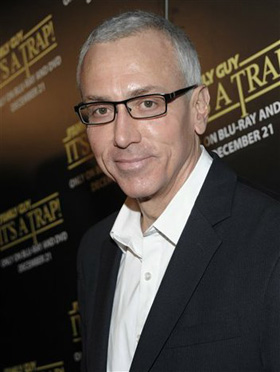 NEW YORK There’s more to Dr. Drew Pinsky’s life than substance-abusing celebrities.
NEW YORK There’s more to Dr. Drew Pinsky’s life than substance-abusing celebrities.
Pinsky and the HLN network hope to share the other elements of his life with the debut Monday of "Dr. Drew," a weekday prime-time talk show. Airing each night at 9 p.m. EST, it will focus on what motivates people in the news.
He is a familiar media presence with the success of VH1’s "Celebrity Rehab." Yet the VH1 hit has effectively pigeonholed him, and Pinsky says his favorite TV experiences were filling in for Larry King or fellow HLN host Joy Behar on more general interest shows.
"People expect somehow it’s going to be an addiction show or a medical show," he said. "My point has always been that certainly these sensibilities and skill sets are going to come to bear here, but that’s not necessarily going to be what the show focuses on." For example, he would have trauma survivors on the show when an earthquake hits; or a recovering drug abuser when a celebrity such as Charlie Sheen is in the news.
"Dr. Drew can speak to a very wide range of news stories because at the core of so many stories we like to talk about are people and the way people are responding — the way they react when they’re under attack or have done something wonderful, and the way they react when fame is thrust upon them," Scot Safon, HLN’s chief executive, said.
Pinsky has just finished taping a fifth cycle of "Celebrity Rehab," expected to air early in the summer. It was a newsy stretch for the show: Fifth season participant Michaele Salahi, the White House party crasher, was kicked off when it became apparent she wasn’t addicted to anything. Mike Starr, former member of the rock band Alice in Chains and a third season celebrity, was found dead on March 8 — the first death of someone treated on the show.
Pinsky said he saw it coming.
Three days before Starr’s body was found Pinsky said he told staff that three of the show’s former patients were going to die soon, and they had to prepare themselves. Starr was on that list (Pinsky wouldn’t reveal the others). He said some doctors anger him by prescribing drugs to people who can’t handle them. Shortly before Starr died, he had talked to Pinsky and complained about back pain.
"I said, ‘Whatever you do, don’t go see a doctor. They will give you pain meds and you’re an opiate addict. That will be a disaster,’" he said. "He said he was listening to me but obviously he wasn’t."
The Pasadena, Calif.-based doctor has built a media career parallel to his medical career, starting with guest shots on the radio advice program "Loveline" in 1984 and eventually taking that show over. His studies focused on internal medicine, but he turned to addiction treatment as a specialty because he saw how it could dramatically transform lives. He works on the staff of Pasadena’s Huntington Memorial Hospital and teaches at the University of Southern California.
Pinsky hesitated when asked if he wanted to continue "Celebrity Rehab" beyond the just-finished season.
"Not sure," he said. "I really have to see how this schedule’s going. This (HLN show) is the focus for me right now."
There’s no hesitation on VH1’s part. It’s one of their most popular shows and they’d love to keep it going.
Pinsky sees himself as an educator through his media work, which has opened him to criticism from those who say a doctor should discuss such things privately with patients.
One recent critic was Sheen. During one of the troubled actor’s many media appearances, an interviewer cued up a clip of Pinsky talking Sheen.
"This ought to be stunning," Sheen said before Pinsky discussed the probability of childhood trauma pushing people into addiction.
"Come on, man, that’s ridiculous," Sheen said. "To like, have a prognosis about somebody you’ve never been in the same room with, based on his image in a media setting? He should be ashamed of himself. I would never sit here and tell you who the heck he is or what drives or fuels him."
Pinsky called the critique bizarre. He said what he does is similar to television commentators on sports or politics who use their expertise to explain a story to the general public.
"By the way, the way that medical students learn is that they read about cases," he said. "They don’t go meet the patient. I’m not treating anybody. I don’t know him. But people are trying to understand what’s going on with this person who lives in the public. I will help people understand what that problem is."
Safon noted that Pinsky takes care to use general language in these situations, and won’t diagnose patients from afar.
"There will always be people who are uncomfortable with his observations, because they’re always uncomfortable with a doctor’s observations," Safon said. "You’re uncomfortable … if they don’t tell you what you want to hear all the time."
Copyright © 2011 The Associated Press. All rights reserved.